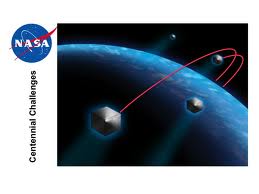 Under the terms of an agreement with the Space Florida Small Satellite Research Center of Cape Canaveral, Florida, NASA has partnered with the company to manage the Nano-Satellite Launch Challenge.
Under the terms of an agreement with the Space Florida Small Satellite Research Center of Cape Canaveral, Florida, NASA has partnered with the company to manage the Nano-Satellite Launch Challenge.
Just one of the space agency’s new Centennial Challenges prize competitions, the $2 million prize for the Nano-Satellite Launch Challenge, goes to the company which is the first to be able to launch satellites with a mass of at least 2.2 pounds (1 kg) into Earth orbit, twice within the span of one week.
The format of the competition is similar to the X-prize competition which awarded a $10 million prize for a manned sub-orbital space flight. That prize was claimed by famed aircraft designer Burt Rutan. With backing from Sir Richard Branson, owner of Virgin Records and Virgin Airlines, their new endeavor called Virgin Galactic is at work creating a space tourism business.
The Nano-Satellite Launch Challenge hopes to encourage innovations in propulsion systems, and related technologies which will eventually lead to safe, reliable, and cost-effective way to routinely get payloads into orbit.
“Monday’s agreement between NASA and Space Florida for use of facilities at the Kennedy Space Center even better positions the organization for managing this new Nano-Satellite Launch Challenge,” said Michael Gazarik, director for NASA’s Space Technology Program at NASA Headquarters in Washington. “Space Florida has extensive experience working with NASA, the FAA, the Air Force, commercial spaceflight companies and universities to advance their plans for spaceflight operations. We look forward to having the Space Florida Small Satellite Research Center overseeing the competition and bringing together innovative teams with creative problem-solving ideas.”
Last month, Pipistrel-USA won the first prize of $1.35 million in NASA’s CAFE Green Flight Challenge. The prize, which was the largest prize ever awarded in aviation, was for a competition which used electric airplanes to break all previous fuel efficiency records. We reported on that challenge in a earlier report which you can read here.
It was a similar competition, held decades ago, which led to the first non-stop flight across the Atlantic by Charles Lindbergh.
In all NASA has awarded close to $6 million in prize money, to 15 different teams, over 22 Centennial Challenges competition events since 2005. To find out more about the program, including complete guidelines and requirements, go to: http://www.nasa.gov/challenges
Additional information about the Nano-Satellite Launch Challenge is available from http://www.spaceflorida.gov/r-d
![Herbal Reference Substances are Key to Everyday Products <!-- AddThis Sharing Buttons above -->
<div class="addthis_toolbox addthis_default_style " addthis:url='http://newstaar.com/herbal-reference-substances-are-key-to-everyday-products/3512112/' >
<a class="addthis_button_facebook_like" fb:like:layout="button_count"></a>
<a class="addthis_button_tweet"></a>
<a class="addthis_button_pinterest_pinit"></a>
<a class="addthis_counter addthis_pill_style"></a>
</div>When it comes to quality control testing and the development of new products, Botanical Reference Materials (BRMs), also known as Herbal References are critically important. To help companies ultimately obtain all-important FDA approval, the Food and Drug Administration provides in its guidance a recommendation that […]<!-- AddThis Sharing Buttons below -->
<div class="addthis_toolbox addthis_default_style addthis_32x32_style" addthis:url='http://newstaar.com/herbal-reference-substances-are-key-to-everyday-products/3512112/' >
<a class="addthis_button_preferred_1"></a>
<a class="addthis_button_preferred_2"></a>
<a class="addthis_button_preferred_3"></a>
<a class="addthis_button_preferred_4"></a>
<a class="addthis_button_compact"></a>
<a class="addthis_counter addthis_bubble_style"></a>
</div>](http://newstaar.com/wp-content/uploads/2021/02/Achillea_millefolium_flowers-100x100.jpg)
![Quality Electrochemical Biosensors are Critical for Medical, Food and Chemical Industry <!-- AddThis Sharing Buttons above -->
<div class="addthis_toolbox addthis_default_style " addthis:url='http://newstaar.com/quality-electrochemical-biosensors-are-critical-for-medical-food-and-chemical-industry/3512086/' >
<a class="addthis_button_facebook_like" fb:like:layout="button_count"></a>
<a class="addthis_button_tweet"></a>
<a class="addthis_button_pinterest_pinit"></a>
<a class="addthis_counter addthis_pill_style"></a>
</div>A number of industries have, at their core, a need to frequent or even continuous analysis of biological media. These include the medical and pharmaceutical fields, biotech firms, and food and chemical companies. To maintain quality standards and develop new products, these industries rely heavily […]<!-- AddThis Sharing Buttons below -->
<div class="addthis_toolbox addthis_default_style addthis_32x32_style" addthis:url='http://newstaar.com/quality-electrochemical-biosensors-are-critical-for-medical-food-and-chemical-industry/3512086/' >
<a class="addthis_button_preferred_1"></a>
<a class="addthis_button_preferred_2"></a>
<a class="addthis_button_preferred_3"></a>
<a class="addthis_button_preferred_4"></a>
<a class="addthis_button_compact"></a>
<a class="addthis_counter addthis_bubble_style"></a>
</div>](http://newstaar.com/wp-content/uploads/2020/10/Electrochemical-Biosensor-100x100.jpg)
![Company Develops Industrial Mixers Well-Suited for both Fragile and Explosive Products <!-- AddThis Sharing Buttons above -->
<div class="addthis_toolbox addthis_default_style " addthis:url='http://newstaar.com/company-develops-industrial-mixers-well-suited-for-both-fragile-and-explosive-products/3512071/' >
<a class="addthis_button_facebook_like" fb:like:layout="button_count"></a>
<a class="addthis_button_tweet"></a>
<a class="addthis_button_pinterest_pinit"></a>
<a class="addthis_counter addthis_pill_style"></a>
</div>Industrial drum mixers are normally applied to blend mixes of varying viscosities such as adhesive slurries or cement. Some of these mixers have the capability of blending mixes of very different particle sizes such as fruit and ice cream, and gravel and cement slurry. The […]<!-- AddThis Sharing Buttons below -->
<div class="addthis_toolbox addthis_default_style addthis_32x32_style" addthis:url='http://newstaar.com/company-develops-industrial-mixers-well-suited-for-both-fragile-and-explosive-products/3512071/' >
<a class="addthis_button_preferred_1"></a>
<a class="addthis_button_preferred_2"></a>
<a class="addthis_button_preferred_3"></a>
<a class="addthis_button_preferred_4"></a>
<a class="addthis_button_compact"></a>
<a class="addthis_counter addthis_bubble_style"></a>
</div>](http://newstaar.com/wp-content/uploads/2020/06/bandeau-sofragir2-100x100.jpg)